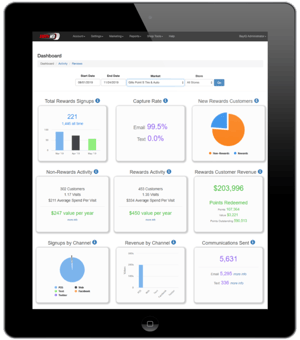In the competitive automotive service industry, tire shops constantly seek ways to attract and retain customers. One powerful tool in this quest is a well-structured loyalty program. However, the effectiveness of any loyalty program is only as good as the key performance indicators (KPIs) it tracks. This blog post will discuss the importance of loyalty program KPIs, focusing on how BayIQ's comprehensive KPI reports empower tire shops to drive growth and customer retention.
Understanding KPIs
Key Performance Indicators, or KPIs, are quantifiable measures used to evaluate the success of an organization, employee, or a specific activity in meeting objectives for performance. KPIs provide a way for businesses to gauge the effectiveness of various functions and processes. For tire shops, common KPIs include average repair order value, number of new customers, and monthly revenue. In addition to these top-line metrics, tire shops should also have KPIs attached to each of their programs, including their loyalty and rewards programs. Tracking loyalty program KPIs helps tire shop owners and managers understand how well their loyalty and marketing strategies attract loyal customers and drive sales.
The Necessity of Metrics-Based Strategies
The tire industry's margin for error is slim, and the competition is stiff. Adopting a metrics-based approach to your loyalty and marketing strategies isn't just advisable; it's imperative. Tracking the right KPIs allows you to make informed decisions, adjust strategies in real time, and set realistic, metric-informed goals. Without KPIs, your marketing efforts can be akin to shooting in the dark, wasting valuable resources with little to show for it.
Critical KPIs for Tire Shops
BayIQ offers detailed reports on various crucial KPIs that should be the cornerstone of any tire shop's loyalty program:
- Total Rewards Sign-Ups: Tracking monthly sign-ups gives you insight into the growth of your loyalty program. Comparing data month over month can reveal trends and the impact of specific marketing campaigns or seasonal changes.
- Email & Text Capture Rate: Knowing how many customers provide their contact information to your shop is vital. A higher capture rate indicates more opportunities to engage with customers through targeted marketing campaigns. It is also helpful if you can break out email and text capture rates by service advisor to help you understand if some service advisors are more effective than others at soliciting contact information.
- Number of Total Customers: Understanding your customer base size and growth is fundamental. This KPI helps you gauge overall market penetration and customer retention rates.
- Number of Customers Enrolled in Rewards: The total number of customers enrolled in your rewards program indicates how effectively your shop has implemented your rewards program.
- Average Number of Visits per Customer: To boost customer retention, measuring the average number of visits per customer is essential. As this number increases, you know your customer retention marketing efforts are paying off.
- Average Repair Order (RO) Value: This metric provides insights into how much customers typically spend. Knowing the average RO value helps set benchmarks and goals for increasing sales.
- Average RO Value for Rewards Customers: Comparing the average spend of rewards customers to non-rewards customers can highlight the effectiveness of your loyalty program in driving higher revenue per customer.
- Revenue from Rewards Customers: Tracking revenue generated specifically from those enrolled in your loyalty program helps quantify the program's ROI and justifies further investment in loyalty-driven initiatives.
- Number of Emails and Texts Sent to Customers: Tracking the communication volume helps ensure you engage with your customers effectively without overwhelming them.
 BayIQ's Loyalty & Rewards Program Dashboard
BayIQ's Loyalty & Rewards Program Dashboard
BayIQ's Role in Empowering Tire Shops
BayIQ's platform provides a comprehensive suite of reports covering these essential KPIs and more. With BayIQ, tire shops can:
- Monitor Growth: Easily track the increase in loyalty program sign-ups and understand customer acquisition trends.
- Enhance Customer Engagement: Analyze the capture rate of emails and texts to optimize communication strategies and improve engagement.
- Understand Spending Patterns: Delve into the details of average RO values to identify opportunities to upsell or cross-sell services.
- Quantify Loyalty Impact: Measure the direct impact of loyalty customers on your bottom line, helping to refine and justify your loyalty initiatives.
- Optimize Communication: Ensure your messages hit the mark without over-saturating your customer base, fostering a positive brand image and customer relationship.
Conclusion
For tire shops, a well-informed loyalty strategy is not just a pathway to success; it's a critical defense against being outmaneuvered by competitors. By leveraging the power of KPIs through platforms like BayIQ, tire shops can transform raw data into actionable insights. This metrics-based approach enables the continual refinement of marketing and loyalty strategies, ensuring that data guide every decision, every opportunity is seized, and every customer interaction is an opportunity to build lasting loyalty.
In the tire industry, where every customer counts, and every service matters, understanding and utilizing loyalty program KPIs isn't just important—it's essential to driving growth, enhancing customer satisfaction, and securing a competitive edge. With BayIQ, tire shops have the tools and insights to turn data into a powerful ally in the quest for customer loyalty and business success. To learn more visit BayIQ.com.

